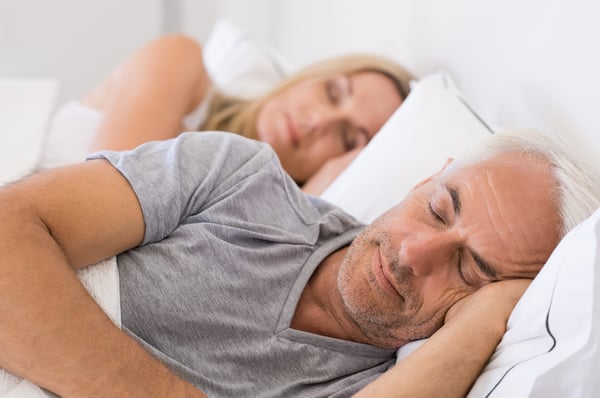
Sleep is an essential component of good health. There are numerous benefits of a good night’s sleep, from physical restoration to improved mental and emotional health from following a routine. Sleep allows us to decompress from our day and to experience a small amount of mindfulness through the night’s pre-sleep ritual. Insomnia can be a serious and overlooked problem in seniors. Luckily, there are several ways to target insomnia and get a better night’s sleep.
There are several reasons why someone might not be sleeping well. First is the lack of a routine. If you have no set bedtime, then you may stay up watching late-night TV one night or go to sleep right after dinner the next. Seniors typically have less hectic schedules, so they may even take naps throughout the day if they feel the need. The lack of a set routine can lead to sleep problems, however. If boredom contributes to unnecessary napping in the middle of the day, the adverse effect can be insomnia at night.
A good sleep routine prepares our bodies for sleep. Winding down, reading a book in bed, or watching a final favorite TV program are all ways that we can prepare ourselves for rest. The most optimal method, however, is to close one’s eyes in peace and darkness, in a quiet bedroom, following a daily sleep routine.
Another reason for possible poor sleep is a less-than-optimal mattress. Mattress technology has advanced considerably, but many keep the same bed for decades. The coils get compressed, and mattresses become lumpy, neither of which provides any health or sleep benefit. New mattress materials, such as memory-foam styles offer numerous sleep benefits. These mattresses help align your spine while you sleep, avoiding pinch points and muscle stress. A leading cause of insomnia is discomfort. A memory-foam mattress relieves pressure and pain, and envelopes the sleeper in a soft cushioning experience. Today’s memory foam mattresses provide a cool night’s sleep as well, unlike older models that could trap body heat. Make sure to check mattress reviews online for the best options.
If you opt to consider memory foam, it's important to make sure it's CertiPUR® certified memory foam, which is independently tested and verified free of PBDEs, TDCPP, or TCEP (“Tris”) flame retardants, ozone depleters, mercury, formaldehyde, lead, and heavy metals. It’s not only important to feel comfortable during sleep, but also to know that your mattress is good for you as well.
Poor diet and lack of exercise are other factors that hurt sleep regularity. One of the magical effects of exercise is how it regulates sleep. The physical exertion of even mild low-impact workouts takes a small but noticeable toll on our bodies. Sleep is how our bodies repair after exercise. Muscles are developed during these periods of rest, and fat burning also takes place. It’s not so much the case that exercise exhausts us, but it helps unconsciously prioritize sleep. For seniors, good exercise routines can include walking, swimming, and cycling. When made a part of a daily or weekly routine, proper rest is but one of the many benefits of exercise.
Diet also affects our periods of rest. If we eat too soon before going to sleep, we may be up all night fighting with our digestive process. Spicy or highly seasoned foods or anything that we are unaccustomed to can also trouble our rest periods. The caffeine in soda, tea, and coffee can also disturb our sleep.
Sleep is essential for us all, but it is vital for senior health. Take some steps to assess your sleep routine, exercise, diet, and mattress, and ensure a good night’s sleep.
FREE EBOOK OFFER : To download The Definitive Guide to Healthy, Natural, Weight loss, click below.






